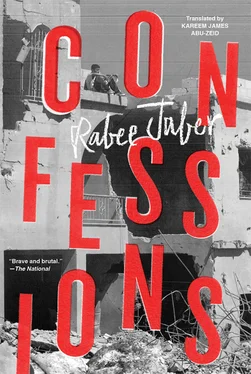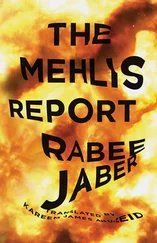Sometimes the two of us weren’t alone. A friend of his would join us up there occasionally — he came by a lot back then, and whenever he visited he’d bring some pastrami. I don’t know how I’ve forgotten his name — I rarely forget names, but I’ve forgotten his. He’d fought alongside Ilya on the mountain. He was tall, very tall, unlike Ilya. He had curly black hair, and whenever he played cards he’d run his fingers through his hair as if to scratch his brain. One time the two of us were alone up there, just me and him — Ilya was snoring, fast asleep. He lit one of his cigarettes for me and said, “Let’s go for a walk.” We walked to the edge of the roof, behind the water tank. From there we could see the lights of the Dawra district and those of the opposite hills. In the Bay of Dawra, the lights of an anchored ship were glistening on the dark surface of the water. That man whose name I’ve forgotten told me a story without once raising his voice: They were attacking a village in a valley by Mount Lebanon, a small village with just a handful of homes. He didn’t know why they were attacking it or who gave the order, but he went with Ilya into a small house. “You wouldn’t believe what a primitive village it was! You wouldn’t believe that villages like that are still around these days. They were still growing silkworms, can you believe it? And they had wooden spoons! They fled when we started firing. People normally don’t flee. But that night they did. Ilya saw a boy hiding behind some sheep. The boy came out with a gun in his hand, and he shot Ilya. I asked Ilya how he managed to do that, why he let the boy shoot him. Do you know what he said? He’d hesitated, he couldn’t shoot the boy. Why? I asked. Why’d you let that happen? What were you thinking? Do you know what he told me? Do you know what your brother said? He said: I was thinking about Maroun.”
I don’t know why the man told me this story. I looked at his face and saw that he was gazing at a point in the distance: maybe he was looking at the boat anchored in the bay, or maybe he was looking at the lights glistening on the sea. His face revealed nothing. (Am I imagining that now? Am I remembering it or imagining it? And how can I tell the difference? Memory’s a massive reservoir, it’s a deep well, it’s got layers upon layers upon layers — what does it bury, and what doesn’t it?)
Najwa never fought in the war. She took part in another training drill — how to plant mines — but she never went to war. When we reminded her later of her combat training, she’d just laugh and say it was madness, a hereditary madness. Was it hereditary? I remember this image, after father struck Ilya on the arm: Ilya standing in the living room at night. The lamp in the room had been turned off, but some light was coming in from the window or from another room, and I saw Ilya’s ghost standing there, the white gauze on his leg visible in the darkness. Was he standing without the cane? I don’t remember. But I remember his leg wrapped in white gauze, and I knew he was looking at the picture on the wall. What was he doing? Talking to the picture? What was he saying?
That was the period when George Sader came and asked for my sister Julia’s hand. He had studied law and had been an intern at the Iddah firm, but he never practiced. He worked at the Fattal Group after abandoning law, and in the darkest days of the war he started his own import-export business and also began trading currency. His mother was related to my mother, and they’d visit our house on special occasions, and my mother, before she fell ill, often took my sisters to go visit their home. My father talked to Julia about it. I remember his words: “It’s your decision. This is your life, and it’s your choice, and I’m your father and I’ll support you either way.”
Ilya said, “There are a lot of men who want to…”
My father silenced him: “I didn’t ask you, Ilya, I asked your sister. The man came and asked for her hand, not yours.”
My sister’s face was serene, and her eyes were unclouded as she looked at my father: “I’ve grown up, father, and I don’t want to wait any longer. He’s a good man, and we’ve become close — why would I say no?”
“Congratulations,” my father replied.
During their engagement, the man came every day at sunset to sit with my sister in the living room. My mother would sit with them a little while, and so would Mary and Najwa, and also Liliane. I’d come in, shake hands with him, and we’d exchange a few words before I went out again. Ilya did the same. The man would sometimes bring a box of baklava with him, and sometimes a cake from Chocolat Nora . One time he brought us a gift from his family (he said it was from his mother) — a sealed glass jar filled with a strangely colored jam. It looked like apricot jam or peach jam, but it smelled different. He said they only make that jam on Mount Lebanon, and that it’s made from pumpkins. It was yellow (the color of lemons), and when you lifted up your fork you could see the fibrous strands. I’ll never forget that evening: as I ate the strange jam, I felt a silent weeping rise from my depths. I was alone in the kitchen, standing at the white sink, and the plate was in the sink. I ate another forkful as the sweet smell (what was that smell?) filled my nose (it filled my head, it filled my heart, I knew that smell, I knew this food, the curious substance melted on my tongue, it melted between my teeth, and a strange dark emotion welled up inside me). I haven’t forgotten how I stood all alone in the kitchen while the light from the lamp fell on the sink’s tiles, illuminating the yellow substance in the glass jar. What was I remembering at that moment?
Years later, as Khalil Sufayr smiled and said what he had to say to me, as the vast living room in his vast house closed in on my body, crushing me with its carpets and paintings and curiosities, its chandeliers still glistening in the light of the vanishing sun, I felt the same food on the roof of my mouth: after we’d eaten cold and flavorless kibbeh from a tray, the servant had brought us some jam.
The first time I had that jam, a river of light burst from my heart. The second time (as I looked at that face clouding over, even as a yellow smile appeared on it), darkness struck my eyes, and I begged to vanish from the world. Certain memories evoke certain other ones — they’re joined by strings invisible yet real.
When the army left West Beirut in the winter of ’84, Najwa came home from her job at the Zahrat al-Ihsan School and told us, as she put her books and papers and quizzes on the dining room table (the table had become her desk), that she wouldn’t be staying in this country. “Every day we say this war needs to end, and every day there’s more destruction — it won’t end.” Six years after she spoke those words, they shelled the presidential palace and attacked East Beirut, and the war ended — but she wasn’t here. She was in Paris. On the phone, she asked me how things were and asked about my father’s health. I heard her distant voice and I remembered how she used to sit with Julia and Julia’s fiancé in the living room: the couple would sit on the sofa beneath the picture with the black ribbon, and Najwa would sit on the sofa, facing the picture. (At night that velvet sofa turned into her bed. She’d put a cotton sheet on it — she was allergic to the velvet, hives appeared all over her skin whenever she slept directly on it — and wrap herself up in a blanket, but she’d never use a pillow, instead she’d just fold her hand beneath her head.) I’d walk past in the hallway on my way out of the house and catch a glimpse of her sitting there, her fingers interlaced on her knees. What was she looking at? Was she looking at Julia and her fiancé, or at my little brother’s picture? I don’t know.
Читать дальше












